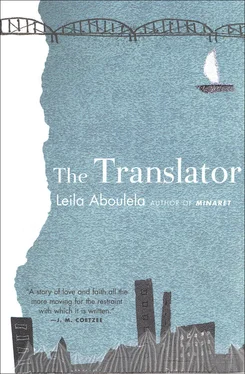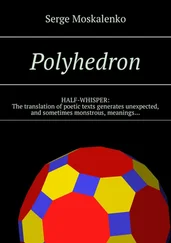When she turned away from the window, one of the catering ladies was walking around spraying the tables with polish and wiping them with a cloth. There were more people in the room, vaguely familiar, reading newspapers, eating breakfast before they started work.
Something light to say. The tea is hot. Yasmin has a cold and she can’t take anything for it because she is pregnant. Diane’s mother is up from Leeds for a visit. Talk of work. Ask about his students, his best student, the man from Sierra Leone. He is finishing up his thesis. Does he have a date set for his viva, yet?
She spoke about the Azhar thesis that she was working on. She had promised him that she would finish the introduction before she left. She said, ‘A lot of the hadiths that are quoted have already been translated before, so I am working faster than I thought I would be. I am learning a lot, things I didn’t know before.’ Here in Scotland she was learning more about her own religion, the world was one cohesive place.
‘What things haven’t you come across before?’
‘One hadith that says, “The best jihad is when a person speaks the truth before a tyrant ruler.” It is not often quoted and we never did it at school. I would have remembered it.’
‘With the kind of dictatorships with which most Muslim countries are ruled,’ he said, ‘it is unlikely that such a hadith would make its way into the school curriculum.’
‘But we should know…’
‘The good thing,’ he said, ‘the balance is that you could know, that the information is there. Governments come and go and they can aggressively secularise like in Turkey, where they wiped Islam off the whole curriculum, or marginalise it like they did most everywhere else, separating it from other subjects, from history even. But the Qur’an itself and the authentic hadiths have never been tampered with. They are there as they had been for centuries. This was the first thing that struck me when I began to study Islam, one of the reasons I admire it.’
‘Why did you begin to study it?’
He said, ‘I wanted to understand the Middle East. No one writing in the fifties and sixties predicted that Islam would play such a significant part in the politics of the area. Even Fanon, who I have always admired, had no insight into the religious feelings of the North Africans he wrote about. He never made the link between Islam and anti-colonialism. When the Iranian revolution broke out, it took everyone here by surprise. Who were these people? What was making them tick? Then there was a rush of writing, most of it misinformed. The threat that the whole region would be swept up in this, very much exaggerated. But that is understandable to some extent because for centuries there had been a tense relationship between the West and the Middle East. Since the seventh century when the church denounced Islam as a heresy.’
Time was not generous. They looked at their watches at the same time. Only a few minutes to nine. People were leaving the room, from the window she could see students walking towards the buildings, going indoors. She said, ‘What are the other reasons that you admire Islam?’
‘It will have to be one reason for now, because there isn’t much time. There are a number of theories,’ he began and she thought, he is talking to me now like he talks to his students. She sometimes wished that she was one of his students, then she could listen to him for hours at a time.
‘… these theories explain why capitalism developed ultimately in Europe and not in other earlier civilisations which were more sophisticated. Civilisations like Muslim Spain or the Ottoman empire. One theory is that for capitalism to grow there must be an accumulation of wealth through inheritance that comes from dynasties and families surviving over a long time. But the sharia’s laws on inheritance and charity fragmented wealth so much that the necessary accumulation never took place. There was a blocking effect, like an internal thermostat or switch that stopped this excess. I think of it as a balance, something that kept things reasonable, steady. And now I have to rush because I have a class.’
After he left, she sat for a few minutes playing with the plastic spoon in her empty cup. Why was it that even though he said such positive things, she was not completely reassured. Months ago Yasmin had asked, ‘Are you hoping he would become a Muslim so you could get married?’ Hope that he would become, fear that he wouldn’t and then what? On the table there was scattered sugar melting in tea stains, particles bouncing towards the anonymity of the carpet or staying to cling gritty and sweet on her fingers and clothes.
Her last Wednesday.
Her last two days. Windows in red and blue flew towards her. They got bigger and clearer as they came close to the surface of the computer screen and then passed away. She had stopped changing Arabic into English, stopped typing; and the words had flickered and disappeared into the blackness from where the flying windows now came. From infinity, specks at first and then vibrant checks and greens.
She thought, the day after tomorrow I shall insha’ Allah be on the train, Coach D, seat number 16F and by this time in the afternoon the train would have long left Scotland.
She was alone in the room because Diane had gone to her weekly Research Methods class. It was as if her presence had kept Sammar working and now she could not concentrate. She stood up and walked around. The room was small, just enough space for the two desks, two swivel chairs, Diane’s Guardian on the floor. She looked out of the window at the parked cars, three students crossing the road, a dark freezing sky. In a few days, on another continent, sunshine all the time.
Tomorrow’s goodbye weighed on her, so that now as she sat down again at the desk, she considered ways of avoiding it, bypassing the awkward words, the little silences in between. In the past when she had imagined leaving this city she had seen herself easily slipping away, casually, with nothing left behind. Now everything was murky and at times she almost forgot why she was leaving. Then she would remember Amir and feel guilty that she rarely thought of him, never dreamt of him. She was far from what her aunt wanted her to be, the child was not the focus of her life, not the centre where once his father had been.
She had no premonition about the knock on the door but she saw the sadness that came in with him. As if it were smoke, as if it had colours. Colours of ivory and mauve, faintly corrosive. Rae sat on Diane’s chair. He said, ‘I’m going away tomorrow,’ and she became confused because she was the one who was going away, her bags were packed, her tickets crisp and new, and she became confused because this was term time and he had classes running, Fareed visiting for a few weeks.
‘Do you remember I spoke to you about my uncle in Stirling?’
She nodded. She remembered him in the nursing home, the elder brother of David, who had gone to Egypt and never came back.
‘He passed away…’
‘Oh I’m sorry.’
Rae looked at the ghostly windows that blew on the computer screen. There was no tragedy in this death. But still the force of death was with them in the room, clean, irreversible. The enemy of continuity had sliced their lives today. But in this defeat there was something comforting, something soft…
He sat with his elbows on his knees and talked about how he had found out, the details of his uncle’s last hours, the funeral ahead. And because endings inspire a looking-back, a summary, she listened to the outline of a completed life, a career, memories from a summer holiday.
He said, ‘I wanted to be with you tomorrow before you left.’
Читать дальше












